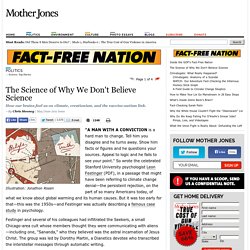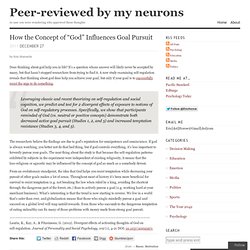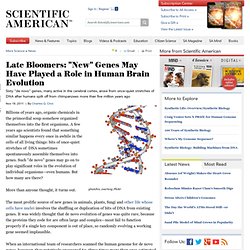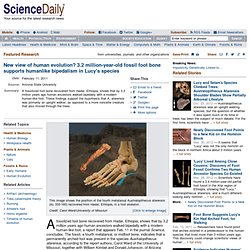

Science on Google+ Bill O'Reilly vs. Richard Dawkins on 'The Magic of Reality' Encyclopedia of Life. Evolutionary Psychology and Biology Applied to Health, Business, and Relationships. The Complete Work of Charles Darwin Online. The Science of Why We Don't Believe Science.
Illustration: Jonathon Rosen "A MAN WITH A CONVICTION is a hard man to change.

Tell him you disagree and he turns away. Show him facts or figures and he questions your sources. Why Did Consciousness Evolve, and How Can We Modify It? Update 5/24/11: The conversation continues in Part II here.

I recently gave a talk at the Directors Guild of America as part of a panel on the “Science of Cyborgs” sponsored by the Science Entertainment Exchange. It was a fun time, and our moderators, Josh Clark and Chuck Bryant from the HowStuffWorks podcast, emceed the evening with just the right measure of humor and cultural insight. Fast-Evolving Brains Helped Humans out of the Stone Age. Just like our animal skin–clad ancestors, we gather food with zeal, lust over the most capable mates, and have an aversion to scammers.

And we do still wear plenty of animal skins. But does more separate us from our Stone Age forebears than cartoonists and popular psychologists might have us believe? The Complete Work of Charles Darwin Online. How sunlight, sex, and sneezes are all connected. How the Concept of “God” Influences Goal Pursuit. Does thinking about god help you in life?

It’s a question whose answer will likely never be accepted by many, but that hasn’t stopped researchers from trying to find it. A new study examining self-regulation reveals that thinking about god does help you achieve your goal, but only if your goal is to successfully resist the urge to do something. 4 Evolutionary Explanations for Modern Annoyances. Soren Bowie is on assignment in the jungles of South America.

Filling in for him today is Los Angeles based writer Joe Donatelli. At some point, your appendix was vital to your survival. Well, not yours in particular. Yours is useless. But humanity's collective appendix was an evolutionary advancement that kept the species alive. . #4. Stephen Hawking at 70: Exclusive interview - 04 January 2012. Evolutionary Psychology and Biology Applied to Health, Business, and Relationships. Encyclopedia of Life. We do have bigger brains than Neanderthals - Technology & science - Science - LiveScience. Modern humans possess brain structures larger than their Neanderthal counterparts, suggesting we are distinguished from them by different mental capacities, scientists find. We are currently the only extant human lineage, but Neanderthals, our closest-known evolutionary relatives, still walked the Earth as recently as maybe 24,000 years ago. Neanderthals were close enough to the modern human lineage to interbreed, calling into question how different they really were from us and whether they comprise a different species.
To find out more, researchers used CT scanners to map the interiors of five Neanderthal skulls as well as four fossil and 75 contemporary human skulls to determine the shapes of their brains in 3-D. Like modern humans, Neanderthals had larger brains than both our living ape relatives and other extinct human lineages. The investigators discovered modern humans possess larger olfactory bulbs at the base of their brains. Late Bloomers: "New" Genes May Have Played a Role in Human Brain Evolution. Billions of years ago, organic chemicals in the primordial soup somehow organized themselves into the first organisms.

A few years ago scientists found that something similar happens every once in awhile in the cells of all living things: bits of once-quiet stretches of DNA sometimes spontaneously assemble themselves into genes. Such "de novo" genes may go on to play significant roles in the evolution of individual organisms—even humans. But how many are there? More than anyone thought, it turns out. Daniel Wolpert: The real reason for brains. Cultural Transmission in Chimpanzees. "Tradition" by Nathaniel Gold Culture defines who we are but few can explain where it comes from or why we adopt one tradition over another.

In the classic musical The Fiddler on the Roof the family patriarch, Tevye, muses on this basic fact of human existence: Here in Anatevka we have traditions for everything… how to eat, how to sleep, even, how to wear clothes. For instance, we always keep our heads covered and always wear a little prayer shawl… This shows our constant devotion to God. Confidence and Why It's Important to Our Evolution. A recent study published in the scientific journal Nature explains how confidence plays an important role in our evolution.

According to the research, confidence motivates us to take action in the face of uncertainty. The more confident we are, the more likely we are to fight for the resources we need to survive. The truth is life is filled with uncertainty. We never really know how the future is going to turn out. And sometimes due to this uncertainty we fear rejection or failure. Autism in Another Ape. Fast-Evolving Brains Helped Humans out of the Stone Age. Jack Horner: Building a dinosaur from a chicken. The New Evolution Therapy. The biologist with the hippest name, Theodosius Dobzhansky, noted that 'Nothing in biology makes sense except in the light of evolution.' The same can be said about the field of psychology.

Clinical concerns such as depression , anxiety, and personality disorders are deeply evolutionary--strategies that helped survival of the individual or their genes . DanDennett. New view of human evolution? 3.2 million-year-old fossil foot bone supports humanlike bipedalism in Lucy's species. A fossilized foot bone recovered from Hadar, Ethiopia, shows that by 3.2 million years ago human ancestors walked bipedally with a modern human-like foot, a report that appears Feb. 11 in the journal Science, concludes.

The fossil, a fourth metatarsal, or midfoot bone, indicates that a permanently arched foot was present in the species Australopithecus afarensis, according to the report authors, Carol Ward of the University of Missouri, together with William Kimbel and Donald Johanson, of Arizona State University's Institute of Human Origins. Monkeys Recognize Poor Grammar. July 8, 2009 Monkeys can form sentences and speak in accents—and now a new study shows that our genetic relatives can also recognize poor grammar. "We were really curious whether monkeys could even detect the common trend found in human language to add sounds to word edges, like adding 'ed' in English to create the past tense," said lead study author Ansgar Endress, a linguist at Harvard University.
Previous research in cotton-top tamarins had shown that the animals can understand basic grammar, for instance, identifying which words logically follow other words in a sentence. Endangered Species: Humans Might Have Faced Extinction 1 Million Years Ago. What explains the ascendance of Homo sapiens? Start by looking at our pets. Who among us is invulnerable to the puppy in the pet store window? 1. The Evolution of Human Biodiversity: Great Ape Biodiversity UCTV. Deeptime.swf (application/x-shockwave-flash Object) New Type of Ancient Human Found—Descendants Live Today? A previously unknown kind of human—the Denisovans—likely roamed Asia for thousands of years, probably interbreeding occasionally with humans like you and me, according to a new genetic study.
Our Family Tree: Chimps, Bonobos And Our Commonality : 13.7: Cosmos And Culture. Hide captionThis figure is adapted from The Demonic Male (Mariner Books, 1997) by Richard Wrangham. Mariner Books This figure is adapted from The Demonic Male (Mariner Books, 1997) by Richard Wrangham. As anticipated last week, I’m here at the Great Ape Trust in Iowa, where I’ve spent a fantastic afternoon with Sue-Savage Rumbaugh and seven bonobos. Since I’ll also be here tomorrow, I’ll blog about the full experience next week.
This week I’ll continue the great-ape theme by walking through the above image — Our Family Tree — and reflecting on some of its implications. Wonderfest 2010: How Did Evolution Shape Human Behavior? Wonderfest 2010: How Did Evolution Shape Human Behavior? News. New Hypothesis for Human Evolution and Human Nature. Click on image for a high-resolution version. Domestic animals, like this water buffalo in Viet Nam, live intimately with humans and provide renewable resources to humans that communicate well with them. Photo by Greg Luna. 20 July 2010 — It's no secret to any dog-lover or cat-lover that humans have a special connection with animals. Neandertal Brains Developed More Like Chimps'
With brains as big as ours, Neandertals were no dumb brutes. Neandertal Children Developed on the Fast Track. Denis Dutton: A Darwinian theory of beauty. What Makes Chimps And Humans Different? : 13.7: Cosmos And Culture. Humans' Big Brains Tied To Chimps' Immunity? How We Are Evolving. Thousands of years ago humans moved for the first time into the Tibetan plateau, a vast expanse of steppelands that towers some 14,000 feet above sea level. How did life originate? Human Evolution Timeline Interactive. Te map. Human Evolution: Oldest Evidence Of Stone Tool Use. Evolution in Action: Lizard Moving From Eggs to Live Birth.
Laurie Santos: A monkey economy as irrational as ours. Smithsonian Human Origins Program. Reconstructing the ups and downs of primate brain evolution: implications for adaptive hypotheses and Homo floresiensis. Becoming Human. Evolution. Stephen Hawking: "Humans Have Entered a New Stage of Evolution" Although It has taken homo sapiens several million years to evolve from the apes, the useful information in our DNA, has probably changed by only a few million bits. "Lucy" Kin Pushes Back Evolution of Upright Walking? Smithsonian Human Origins Program. The Future of Human Evolution Website. Evo_large.gif (GIF εικόνα, 2420x915 εικονοστοιχεία) - Σε κλίμακα.